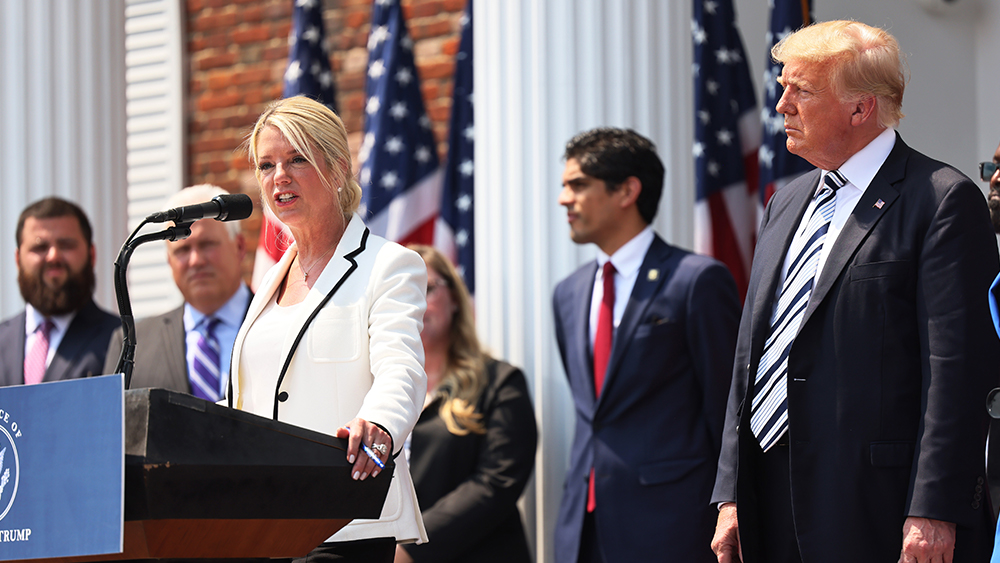The Jewish Radicals: A history of Revisionist Zionism and its controversial legacy
02/17/2025 / By Arsenio Toledo

- Historian Eran Kaplan’s book, “The Jewish Radical Right: Revisionist Zionism and Its Ideological Legacy,” explores the radical undercurrents of Zionism and their impact on Israel’s political and cultural landscape.
- The Revisionist Zionists, led by figures like Ze’ev Jabotinsky, emerged in the early 20th century as a faction within the broader Zionist movement, rejecting socialist ideals and advocating for a more radical approach to establishing a Jewish state.
- Jabotinsky’s experiences in Fascist Italy influenced his belief in nationalism and military strength, leading him to create the Jewish Legion to fight for British forces during World War I.
- The Revisionists’ split from the World Zionist Organization in the late 1930s marked a shift towards practical political action, with the rise of the paramilitary group Irgun and its leader, Menachem Begin, who later implemented policies reflecting the Revisionist vision.
- Kaplan’s book reveals the ongoing influence of Revisionist Zionism on modern Israeli politics, as seen in the expansion of illegal Jewish settlements in the West Bank and the promotion of Jewish nationalism by figures like Prime Minister Benjamin Netanyahu.
In a provocative exploration of Zionism’s radical undercurrents, historian Eran Kaplan’s book, “The Jewish Radical Right: Revisionist Zionism and Its Ideological Legacy,” reexamines a movement that has profoundly shaped the political and cultural landscape of Israel.
The Revisionist Zionists, as Kaplan explains, were a faction within the broader Zionist movement that emerged in the early 20th century. While traditional Zionist leaders like Theodor Herzl envisioned a Jewish state built on liberal and socialist principles, the Revisionists sought a more radical approach to realizing the Zionist dream.
Pioneered by figures like Ze’ev Jabotinsky, the Revisionists, as they were known, rejected the socialist ideals embraced by the Labor Zionists, who sought to create a new, collectivist Jewish society centered on the halutz, or Jewish pioneers who would settle Palestine as agricultural laborers.
Instead, Revisionists like Jabotinsky argued that the primary goal of Zionism should be the establishment of a Jewish state, regardless of the political or ideological trade-offs. It advocated for all Jews to cultivate a nationalist outlook and reject socialist and liberal values.
Jabotinsky’s influence on the movement was profound. His experiences in Fascist Italy during the 1920s shaped his belief in the power of nationalism and military strength. He advocated for the creation of a Jewish Legion to fight for British forces during World War I, seeing it as a crucial step toward the establishment of a Jewish state. For Jabotinsky, the Zionist movement’s success depended on its ability to assert Jewish power and sovereignty, rather than focusing on ideological debates about the nature of the future state.
The 1920s and 1930s were a tumultuous period for Revisionist Zionism. The movement became increasingly vocal in its criticism of the Labor Zionists, who dominated the Zionist establishment. The Revisionists established their own organizations, such as Ha-Tzohar, and created youth movements like Beitar, which embraced Jabotinsky’s ideas of militarism and national consciousness. The Revisionists saw themselves as the true vanguard of the Jewish nation, advocating for a return to a more traditional, nationalist identity.
By the late 1930s, the Revisionists had split from the World Zionist Organization, forming the New Zionist Organization. This marked a turning point in their transition from ideological battles to practical political action.
The rise of the Irgun, a paramilitary group associated with the Revisionists, further exemplified this shift. The Irgun was more aggressive than the mainstream Haganah, engaging in attacks on both Arab and British targets. Its leader, Menachem Begin, would later become a pivotal figure in Israeli politics, leading the Likud party to power in 1977 and implementing policies that reflected the Revisionist vision of territorial maximalism.
The Revisionist movement was far from monolithic, with internal divisions shaping its trajectory. The maximalists, who openly embraced fascism and rejected socialism and liberalism, were at odds with more moderate factions led by Jabotinsky. While Jabotinsky shared the maximalists’ commitment to Zionism, he feared their radicalism would marginalize the movement. Despite these differences, both factions shared a belief in the power of nationalism and the need for a radical transformation of the Jewish national psyche.
According to Kaplan, the Revisionists’ rejection of modernity and their emphasis on Jewish nationalism continue to shape Israeli politics. The Likud party’s current focus on the expansion of illegal Jewish settlements in the Palestinian West Bank reflect Revisionist Zionism’s goal of territorial maximalism.
Even in recent years, figures like Prime Minister Benjamin Netanyahu have drawn on Revisionist ideas, promoting Jewish nationalism and a skepticism of the non-Jewish world.
Eran Kaplan’s “The Jewish Radical Right” challenges traditional narratives of Zionism, revealing a movement that is far more complex and diverse than commonly understood.
As the book demonstrates, the ideological battles of the past continue to shape the present, as Revisionist ideas influence modern Israeli politics and identity. By revisiting this controversial chapter of Zionist history, Kaplan encourages readers to reconsider the diverse forces that have shaped the Jewish national movement and its ongoing relevance in the 21st century.
Watch this video discussing Eran Kaplan’s “The Jewish Radical Right: Revisionist Zionism and Its Ideological Legacy.”
This video is from the BrightLearn channel on Brighteon.com.
Sources include:
Submit a correction >>
Tagged Under:
Benjamin Netanyahu, big government, conspiracy, culture war, deep state, Eran Kaplan, Hidden History, Holy War, identity politics, ideology, Israel, left cult, political ideology, politics, propaganda, real history, Revisionist Zionism, truth, Ze'ev Jabotinsky, zionism
This article may contain statements that reflect the opinion of the author
RECENT NEWS & ARTICLES
COPYRIGHT © 2017 IDENTITY POLITICS NEWS




















